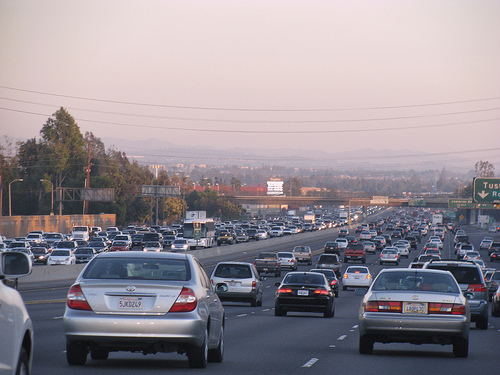Looking at all of the vehicles on the average U.S. highway, it's hard to imagine that car use could ever decline.
Yet that's exactly what some analysts are predicting. A new report from Bloomberg claims the growth of megacities will be bring about "Peak Car"--the point at which new-car sales stop increasing--in the next decade.
The prediction is that car sales will reach 100 million a year--up from last year's global total of 82 million--sometime in the next decade, and then decline, owing to increasingly onerous driving conditions in large cities.
Urbanization vs mobilization
Bloomberg cites data from research firm PricewaterhouseCoopers, which says that about half the world lives in urban areas. That number is expected to increase 25 to 50 percent over the next decade.
According to PwC, in 25 years, 9 billion people will live in cities--more than the Earth's population today.
That will only exacerbate traffic problems, making the personal car more of an inconvenience than an enabler of mobility. This is already becoming an issue in one of the most important new-car markets: China.
China becomes world's No. 2 vehicle market
Last year, China became the first nation to surpass 20 million new-car sales, and it is currently the world's largest new-car market.
However, the government-backed China Association of Automobile Manufacturers believes sales will only grow another 10 percent, then steadily decline.
As the country is choked by smog and traffic jams, increasingly vocal consumers are expected to buy fewer cars and encourage the government to regulate them more strictly.
While national government policies include things like emissions standards and electric-car incentives, some cities plan simply to remove vehicles from their streets.
Beijing plans to slash car-sales quotas by 40 percent, and scrap 180,000 of its worst-polluting vehicles. Shijiazhuang--capital of the steel-producing Heibei province--will limit households to two cars and limit total sales to 100,000 per year.
U.S.: Alternatives gain traction
The United States has nowhere near the pollution or congestion problems of China, but Americans may have maxed out their vehicle ownership.
The Federal Highway Administration has found that annual per-capita Vehicle Miles Traveled (VMT) peaked in 2004, and have declined steadily since then.
Another study, released last October by the American Association of State Highway and Transportation Officials, found that the number of "Zero-Car Families" in the U.S. is on the rise. This is the first time in decades that the number of households without a car has risen.
That could be due in part to the increased availability of alternatives--including the option to drive a car without owning one.

Southern California traffic - by flickr user David R. Blume
Some city dwellers also have better access to public transportation than they have in the past, and more are now biking or walking than in previous years.
Advances in communication technology also make it possible for more people to work from home, and less necessary for young people to have cars in order to socialize.
That--along with environmental consciousness and the high cost of car ownership--means young people are driving less.
One issue that may need to be separated from these trends is the 2007-2008 financial crisis, however. It obviously discouraged spending on cars, especially new-car sales, and may have changed some buyers' attitudes toward car purchases.
Zipcar will add the 2012 Ford Focus to its college car-sharing locations
Then there are the cars themselves.
Last year, research firm R.L. Polk said the average age of a vehicle on U.S. roads was a record 11.4 years--and that today's new cars will last even longer. That means there's less need to replace them as often.
Regardless of total new-car sales, the fleet will inevitably get greener as stricter emissions and fuel-economy regulations take effect globally, and electrification becomes more commonplace.
But even if the number of new cars on the world's roads declines in some future year--or at least, stops rising--cars are highly unlikely to exit the mainstream.
The U.S. has spent 70 years building dispersed, low-density suburbs with no practical mass transit, and other countries are following suit.
For residents of those areas, vehicles remain necessary just to live--regardless of the majority of the world's citizens who live in congested megacities somewhere else.
In other words: Don't expect the number of cars to fall significantly in your lifetime.
_______________________________________________












